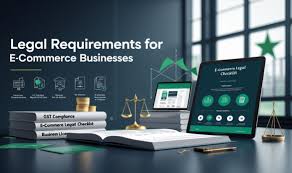Legal Setup for E-Commerce Businesses: A Comprehensive Guide
In the rapidly expanding world of e-commerce, establishing a legally compliant business is crucial to ensuring long-term success. Online stores not only face intense competition and marketing challenges but also a complex web of legal requirements that vary widely across jurisdictions. This article, provided by the Legal Marketplace CONSULTANT, aims to comprehensively guide e-commerce entrepreneurs through the essential legal aspects that must be considered when setting up and operating an online business in 2025.
Understanding the Legal Landscape of E-Commerce
The e-commerce industry is governed by a multifaceted legal framework that encompasses consumer protection laws, data privacy regulations, taxation rules, and contractual obligations. Unlike traditional brick-and-mortar stores, online businesses operate across multiple regions, each with their specific legal requirements. Entrepreneurs must understand these to avoid pitfalls that can lead to costly fines, penalties, or reputational damage.
Key components of the legal landscape include:
- Terms of Service agreements that outline the rules for using your website and services;
- Privacy Policies that govern the collection, storage, and use of customer data in compliance with laws such as GDPR and CCPA;
- Sales tax regulations which differ by state or country, affecting how taxes are collected and reported;
- Intellectual Property protections to safeguard your brand and products;
- Consumer rights and e-commerce specific legislation such as return policies and disclosure requirements;
- Shipping and fulfillment legal considerations including contracts with carriers and international shipping restrictions.
Drafting Effective Terms of Service (ToS)
Terms of Service constitute the contractual backbone between your e-commerce platform and your customers. This legal document establishes the rules that govern the use of your website and services, setting expectations for users and limiting your liability in various scenarios.
An effective ToS should include:
- User eligibility and age restrictions;
- Account creation and security responsibilities;
- Payment terms, including accepted methods and dispute resolution;
- Product descriptions and availability disclaimers;
- Limitation of liability clauses to protect your business from damages claims;
- Termination or suspension rights related to user conduct;
- Governing law and jurisdiction to handle disputes;
- Modification procedures and notification methods for updates to the agreement.
Regularly reviewing and updating your ToS ensures it stays compliant with evolving laws and business practices.
Privacy Policies: Protecting Customer Data and Ensuring Trust
Data privacy has become a paramount concern for e-commerce businesses globally. Regulations such as the European Union’s General Data Protection Regulation (GDPR) and the California Consumer Privacy Act (CCPA) impose strict requirements on how businesses collect, store, and process personal data.
Your Privacy Policy must transparently explain:
- What personal data is collected from customers;
- How and why this data is used;
- Data storage and protection measures in place;
- Customer rights regarding their data, such as access, correction, deletion, and opting out of marketing;
- Use of cookies and tracking technologies;
- Third-party data sharing and processing agreements;
- Contact information for privacy inquiries or complaints.
Compliance with privacy laws not only avoids fines but also builds customer confidence and loyalty.
Navigating Sales Tax Challenges
Sales tax regulation is one of the most complex legal issues for e-commerce businesses operating in the United States. Unlike physical stores, where tax collection depends on the store location, online retailers must consider the customer's location to determine tax obligations.
Since the landmark Supreme Court decision in South Dakota v. Wayfair, Inc. (2018), states can require remote sellers to collect sales taxes even without a physical presence if certain economic thresholds are met.
To stay compliant, online merchants should:
- Determine nexus — whether their business has a tax presence in a state based on sales volume or number of transactions;
- Register with appropriate state tax authorities where nexus is established;
- Collect and remit sales taxes at the correct rates per jurisdiction;
- Stay updated on changing tax laws and thresholds;
- Utilize automated tax software to manage calculations and filings efficiently;
- Maintain accurate records of all transactions and tax filings for audit purposes.
Intellectual Property and Branding Protection
Your brand is one of your most valuable business assets. Protecting trademarks, copyrights, and other intellectual property (IP) rights safeguards your reputation and prevents unauthorized use or infringement.
Key steps for IP protection include:
- Registering trademarks for your brand name and logo;
- Ensuring your product descriptions, images, and content do not infringe on others’ rights;
- Monitoring the internet and marketplaces for counterfeit products or IP violations;
- Using appropriate licensing agreements when necessary;
- Implementing strict policies regarding user-generated content and contributions on your platform.
Consumer Rights and E-Commerce Regulations
Consumer protection laws impose obligations on e-commerce businesses to ensure fair trading practices. These include transparent pricing, truthful marketing, right of withdrawal, and clear information about product returns and refunds.
Online retailers should establish policies that address:
- Clear and conspicuous display of prices, taxes, and additional fees;
- Accurate and honest product descriptions and images;
- Easy-to-understand return, exchange, and refund processes;
- Protection against fraudulent transactions and chargebacks;
- Effective customer service channels for addressing disputes or complaints;
- Compliance with specific regulations such as the Consumer Rights Directive (EU) or country-specific statutes.
Shipping, Fulfillment, and Contractual Considerations
Shipping and fulfillment involve contractual relationships with carriers and third-party logistics providers. Legal issues can arise around delivery timelines, lost or damaged goods, customs regulations, and international shipping restrictions.
To mitigate risks, e-commerce businesses should:
- Establish clear terms with logistics partners regarding liability and service levels;
- Inform customers about expected delivery times and applicable shipping fees;
- Comply with customs requirements for international shipments;
- Implement insurance coverage for high-value goods;
- Develop contingency plans for delays or disruptions in the supply chain;
- Ensure packaging complies with regulations regarding safety and environmental standards.
Taxation Beyond Sales Tax: Other Considerations
Beyond sales tax, e-commerce businesses may need to address other tax obligations including income tax, value-added tax (VAT) for cross-border transactions, payroll taxes if employees are hired, and business licensing fees.
Maintaining compliance requires:
- Proper bookkeeping and accounting practices;
- Filing accurate and timely tax returns;
- Consulting with tax professionals specialized in e-commerce;
- Understanding international tax treaties when operating globally;
- Regularly updating business licenses and permits as required by local authorities.
Addressing Legal Challenges in Marketing and Advertising
Marketing is essential to grow your e-commerce brand, but must conform to laws governing advertising truthfulness, intellectual property, privacy, and spam regulations such as CAN-SPAM Act.
Entrepreneurs should:
- Ensure all claims in marketing materials are truthful and substantiated;
- Avoid deceptive or misleading advertising;
- Obtain necessary consents for email marketing and respect unsubscribe requests;
- Maintain compliance with influencer marketing disclosures;
- Protect copyrighted material used in advertising campaigns.
Importance of Legal Counsel for E-Commerce Businesses in 2025
As legal requirements continue to evolve rapidly, having a dedicated legal advisor is paramount for e-commerce businesses. Legal professionals can tailor contracts, ensure regulatory compliance, protect the business from liability, and help navigate complex scenarios such as international sales or dispute resolution.
Legal Marketplace CONSULTANT offers experienced attorneys, tax consultants, and compliance specialists ready to assist online retailers in establishing robust legal foundations to grow sustainably and securely.
Legal Marketplace CONSULTANT provides comprehensive legal support for e-commerce businesses including contract drafting, intellectual property protection, and compliance advice.
Our tax consultants specialize in e-commerce taxation nuances, ensuring correct sales tax, VAT, and income tax compliance.
We assist businesses in creating privacy policies that meet GDPR, CCPA, and other data protection regulations to safeguard customer data.
Establishing a legally compliant e-commerce business in 2025 requires an intricate understanding of various legal domains and adherence to dynamic regulations. From drafting precise Terms of Service and transparent Privacy Policies to complying with complex tax laws and protecting intellectual property, every aspect plays a vital role in securing your business’s reputation and long-term profitability. Businesses that proactively address these legal challenges and seek professional counsel will be well-positioned to thrive in the competitive online marketplace.
If you need proper legal help to navigate the complexities of e-commerce law, feel free to reach out to Legal Marketplace CONSULTANT through communications in our bio or by sending a private message. Building your e-commerce brand the right way starts with solid legal foundations.































